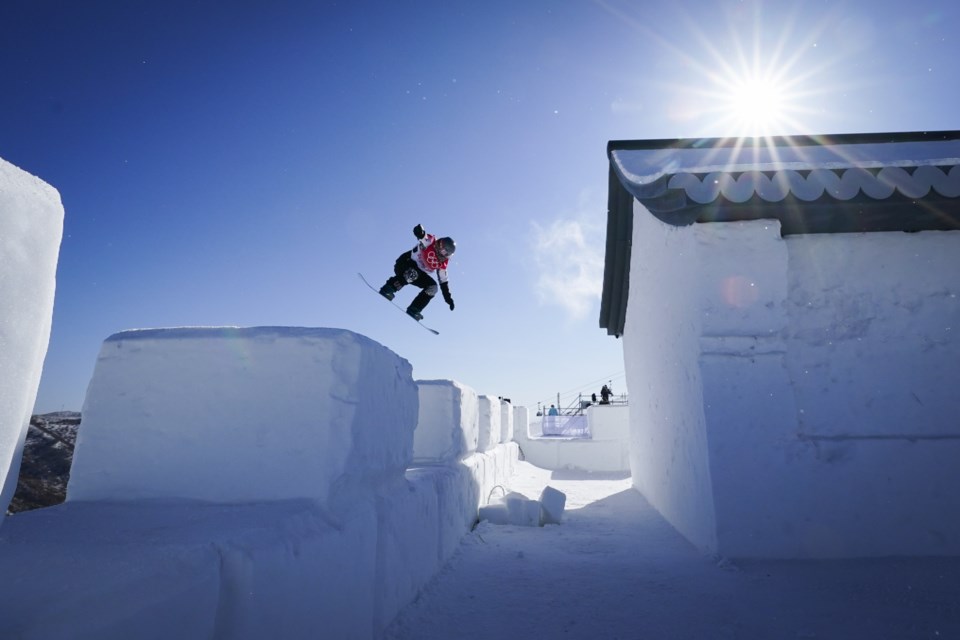ZHANGJIAKOU, China (AP) ŌĆö Not even "The Great WallŌĆØ could stave off a piercing, bone-chilling wind.
The snow replica of ChinaŌĆÖs iconic monument lined the top of the Olympic slopestyle course to cut down on the blustery conditions. All it really did Saturday was provide an eye-catching backdrop.
In gusty conditions that led to arctic-feeling wind chills, two-time defending Olympic champion Jamie Anderson and the rest of the women's snowboarders glided through the rails and jumps ŌĆö albeit a little chilled ŌĆö during the qualifying round in the mountains above Beijing.
Some riders wore hand and feet warmers to protect against the elements. Others donned facemasks or neck sleeves to keep the whipping wind at bay.
Nothing fully worked. Not even the protection of ŌĆ£The Great Wall.ŌĆØ
ŌĆ£I like the Great Wall. I do think it's helping a little bit, for sure,ŌĆØ said Anderson, who finished fifth in qualifying to make Sunday's 12-woman final.
Then, she jokingly added: "They need a bigger wall.ŌĆØ
The temperature hovered around 5 degrees F (minus-15 degrees C) and felt like minus-12 F (minus-24 C) during the competition. The wind was listed at 13 mph (21 kph), but the more telling sight may have been a wind sleeve next to the final jump: It was blowing straight out, then sideways, then straight out again.
ŌĆ£It's cold,ŌĆØ Anderson said. ŌĆ£ItŌĆÖs hard to, like, keep your core temperature warm and then doing tricks feels a little bit more intimidating.ŌĆØ
Zoi Sadowski Synnott of New Zealand navigated the extreme conditions to turn in qualifying's top score of 86.75. Synnott might just be the biggest challenger to Anderson. She beat Anderson last month at the Winter X Games.
Then again, the wind could play a big role, too. It did four years ago at the Pyeongchang Olympics, when Anderson won her second straight title. It was held in windy, subpar conditions while across the mountain the Alpine race was called off.
Of the elements Saturday, Synnott said: "The wind is a bit tricky. You can feel it sometimes when youŌĆÖre on the course, but not enough to throw you off your game. You just have to really adapt.ŌĆØ
That's what Hailey Langland did after wiping out on her first run. With hand warmers stuffed in her gloves and feet warmers in her boots, Langland blocked the wind out of her mind and just went for it.
ŌĆ£It's gnarly because the wind gusts, theyŌĆÖre no longer coming straight downhill. TheyŌĆÖre now starting to swirl in between the jumps and in the rails and starting to come uphill,ŌĆØ said Langland, who finished ninth in qualifying. ŌĆ£That can really deter your gauge of what speed you should be taking into these features, which can cause, obviously, some really bad consequences.ŌĆØ
Another challenge were some of the jumps with approaches that were angled into the kickers instead of straight-on. TheyŌĆÖre unlike most jumps riders spring off in other contests, but this style was featured four years ago in South Korea.
ŌĆ£IŌĆÖm starting to get used to it more," said Julia Marino, who was sixth to advance.
Not so much the snow under their snowboards, though. The machine-made snow had a different feel, especially on a fall. Anderson said she had a bruise to show for the snow that felt ŌĆö as Marino described ŌĆö like concrete.
ŌĆ£IŌĆÖm impressed that they did it,ŌĆØ Anderson said of the manmade snow. ŌĆ£But, damn, itŌĆÖs like not that enjoyable to ride on.ŌĆØ
To keep warm before her run, Langland also bundled up in a giant parka. As for those warmers she just started to use, she had a description for them: ŌĆ£Life-changing,ŌĆØ she joked.
Tess Coady of Australia wore a dark facemask under her helmet, along with dark lenses in her goggles.
ŌĆ£Intimidation,ŌĆØ cracked Coady, who finished eighth. ŌĆ£ItŌĆÖs so cold. My nose is like dying.ŌĆØ
For Enni Rukajarvi, this felt almost balmy compared to what it's like back home in Finland.
ŌĆ£Somehow it feels warmer here than in Finland,ŌĆØ Rukajarvi said after taking third in qualifying. ŌĆ£When it's minus-20 in Finland, itŌĆÖs way colder.ŌĆØ
Marino didn't even feel the cold on her final run, she said, simply because she was so focused after a mistake on her first attempt.
ŌĆ£I just wanted to make it to the end of the course,ŌĆØ said Marino, who hung out in the athletes' lounge at the top to stay warm before her run. ŌĆ£I did not look at the flags at all. I was just like, ŌĆśIŌĆÖm going to go for my run no matter what. I donŌĆÖt care about the wind. IŌĆÖm going throw down what I came here to throw down.ŌĆÖŌĆØ
Adrenaline fueled that second run. Then, a blast of reality hit in the finish area.
ŌĆ£IŌĆÖm starting to feel (the cold)," Marino said.
___
More AP Olympics: https://apnews.com/hub/winter-olympics and https://twitter.com/AP_Sports
Pat Graham, The Associated Press


